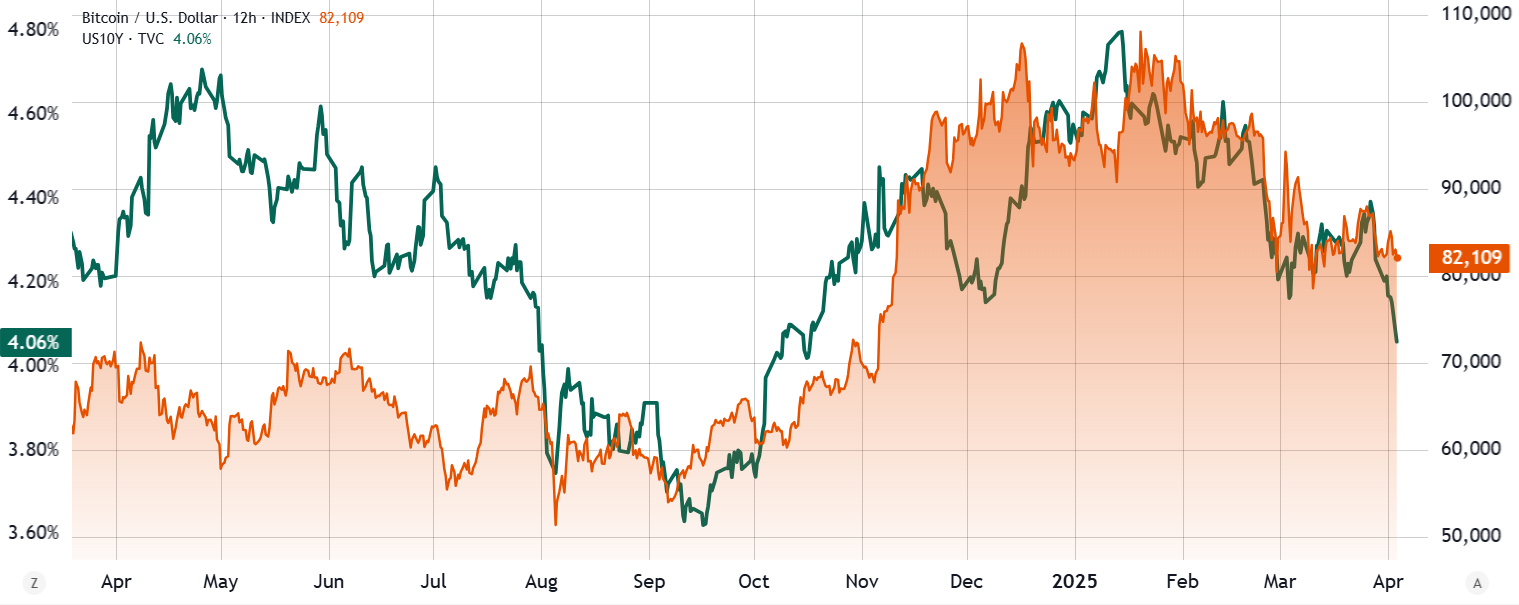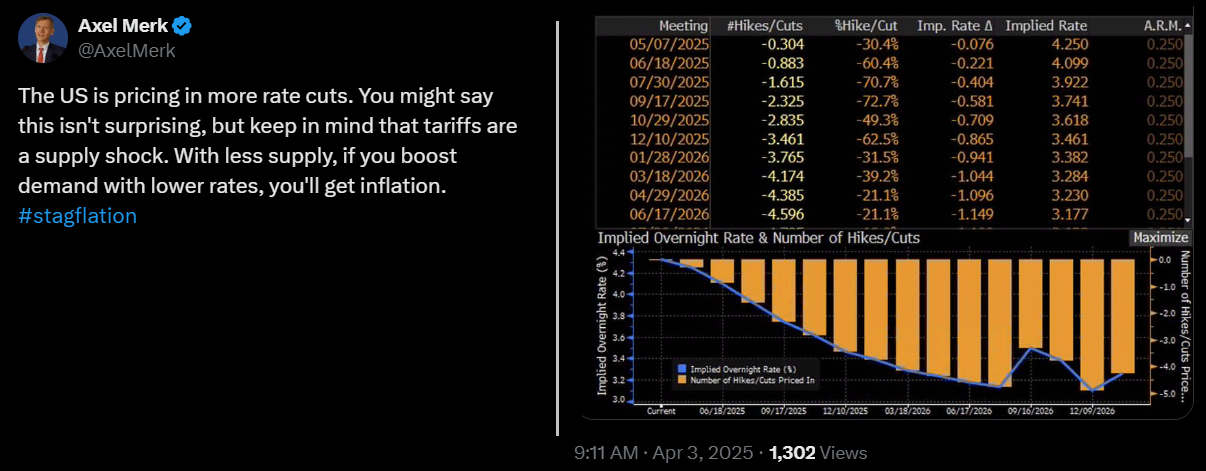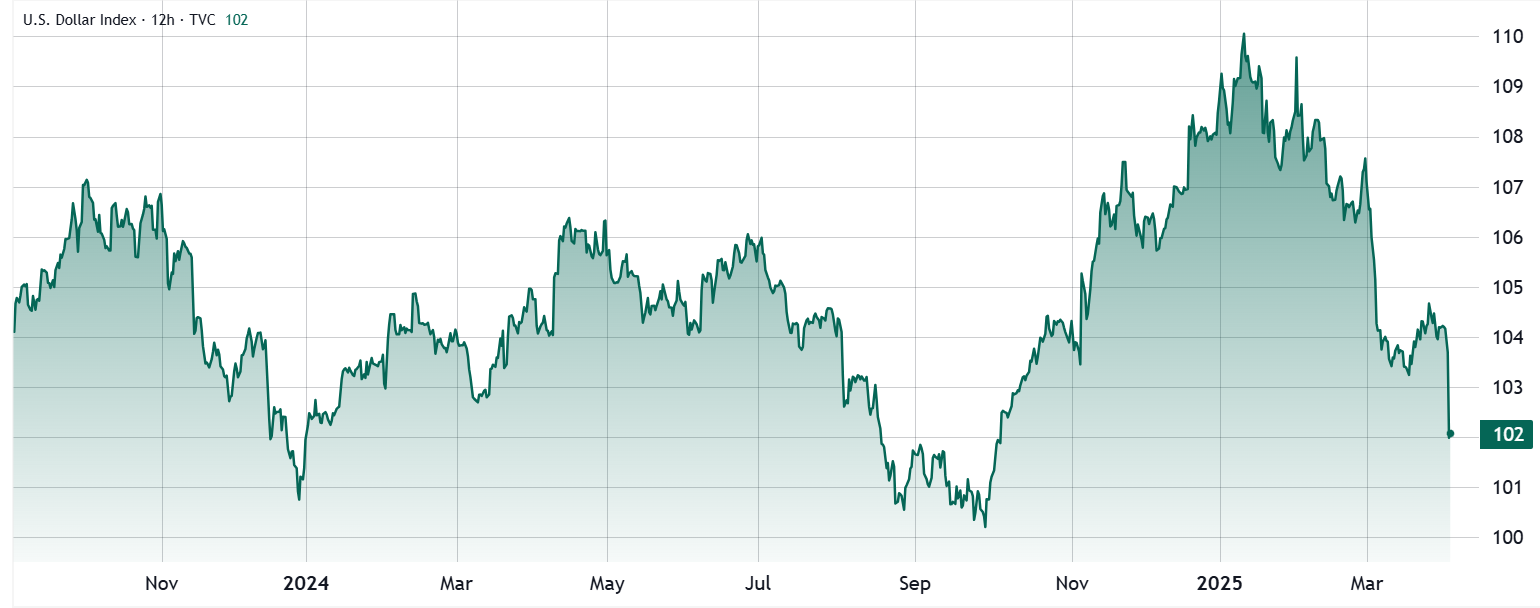On April 3, long-term US government debt yields dropped to their lowest point in six months as investors expressed heightened concerns about the escalating global trade war and the declining US dollar. The yield on the 10-year Treasury note briefly fell to 4.0%, down from 4.4% just a week prior, indicating robust demand from buyers.

US 10-year Treasury yield (left) vs. Bitcoin/USD (right).
At first glance, the increased risk of an economic recession may have unfavorable implications for Bitcoin (BTC). However, lower yields from fixed-income investments often drive investors toward alternative assets, including cryptocurrencies. Over time, it’s likely that traders will seek to lessen their bond exposure, particularly if inflation continues to rise. Consequently, the possibility of Bitcoin reaching an all-time high in 2025 is still very much alive.
Tariffs induce ‘supply shock’ in the US affecting inflation and fixed-income yields
One could suggest that the newly imposed US import tariffs negatively impact corporate profits, prompting some firms to reduce leverage and thereby decreasing market liquidity. Ultimately, any actions that heighten risk aversion tend to exert a short-term negative influence on Bitcoin, especially given its strong link to the S&P 500 index.
Axel Merk, chief investment officer and portfolio manager, noted that tariffs create a “supply shock,” meaning that the reduced availability of goods and services due to rising prices leads to an imbalance in demand. This effect intensifies if interest rates are falling, potentially setting the stage for inflationary pressures.

Source: X/AxelMerk
Even if Bitcoin is not seen as a hedge against inflation, the attractiveness of fixed-income investments becomes significantly diminished in such conditions. Moreover, if a mere 5% of the world’s $140 trillion bond market seeks greater returns elsewhere, this could result in $7 trillion being redirected to stocks, commodities, real estate, gold, and Bitcoin.
Declining US dollar and gold’s record highs boost alternative assets
Gold has soared to a $21 trillion market cap, achieving consecutive all-time highs and still displaying considerable room for price appreciation. Increased prices allow previously unprofitable mining operations to restart and motivate further investments in exploration, extraction, and refining. As production boosts, supply growth will inherently serve as a limiting factor on gold’s long-term bullish trajectory.
Regardless of shifts in US interest rates, the US dollar has weakened against a basket of foreign currencies, as indicated by the DXY Index. On April 3, the index fell to 102, hitting its lowest benchmark in six months. A dip in confidence regarding the US dollar, even relatively, could spur other nations to search for alternative stores of value, including Bitcoin.

US Dollar Index (DXY).
This transition won’t occur overnight, but the trade war may prompt a slow move away from the US dollar, especially among countries feeling pressured by its dominance. While a return to the gold standard or Bitcoin emerging as a significant part of national reserves is unlikely, any shift away from the dollar enhances Bitcoin’s long-term growth potential and strengthens its position as an alternative asset.
Related: Trump ‘Liberation Day’ tariffs create chaos in markets, recession concerns
To provide context, Japan, China, Hong Kong, and Singapore together hold $2.63 trillion in US Treasuries. If these regions opt for retaliation, bond yields could reverse their current trend, increasing the cost of new debt issuance for the US government and further undermining the dollar. In this scenario, investors would likely steer clear of adding exposure to stocks, instead favoring scarce alternative assets like Bitcoin.
Pinpointing Bitcoin’s market bottom is exceedingly difficult, but the resilience shown by the $82,000 support level despite escalating global economic uncertainty is a promising indicator.
This article is intended for general informational purposes and should not be construed as legal or investment advice. The views and opinions expressed here belong solely to the author and do not necessarily reflect those of any affiliated entity.
